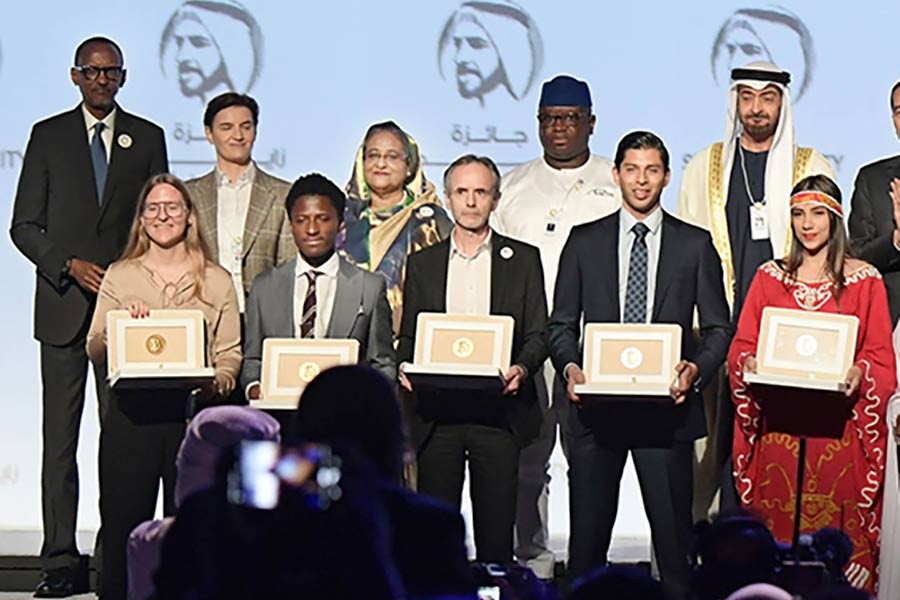
Published :
Updated :

The United Arab Emirates (UAE) is the Middle East's second largest economy, after the Kingdom of Saudi Arabia (KSA). With a small population of over 9.3 million, six per cent of the world's oil reserves and highly advanced infrastructure, the UAE has one of the highest per capita incomes ($43419) in the world.
Driven by political, economic and cultural relations, the UAE occupies an important place in Bangladesh foreign policy. Notably, the UAE was the first Gulf country to recognise Bangladesh and establish formal diplomatic relations. It also played an important role in obtaining Bangladesh's membership in the Organisation of Islamic Countries (OIC). Bangladesh opened its embassy in Abu Dhabi, the capital of the UAE, on March 23, 1974.
Bangabandhu Sheikh Mujibur Rahman officially visited the UAE in 1974 and held a historic meeting with the late Sheikh Zayed bin Sultan Al Nahyan. Indeed, Sheikh Mujib's initiative and acumen led the founding of a strong bond of friendship between the two countries. The founder of the UAE, late Sheikh Zayed bin Sultan Al Nahyan visited Bangladesh in 1984 to expand bilateral relations.
Bangladesh and the UAE signed a cultural cooperation agreement in March 1978 and General Trade Agreement in 1984. To boost up economic cooperation, two agreements i.e. Agreement on the Avoidance of Double Taxation, and Promotion and Reciprocal Protection of Investment were signed in January 2011. Bangladesh and the UAE have also signed an Air Services Agreement in October 2017 to strengthen relations. All these agreements had a positive impact on economic cooperation, investment promotion, and trade expansion between the two countries.
At present, the UAE is a leading trading partner and a major source of investment for Bangladesh in the Middle East. Two-way trade has significantly increased in recent years and hit $1.3 billion in 2019. The main exports of Bangladesh to the UAE are readymade garments, knitwear, vegetables, frozen fish, fruit juice, tea, spices, melamine tableware, cables, jute products etc. On the other hand, Bangladesh imports crude oil and other petroleum products from the UAE.
The UAE also remains one of the most important foreign investors in Bangladesh with about $7.0 billion investment in energy, ports, and power and infrastructure sectors. An estimated over 700,000 Bangladeshi skilled and unskilled workers live and work in the UAE in a number of occupations and are contributing to the economic development of both the countries. Notably, the UAE has emerged as the second largest remittance nation for Bangladesh after the KSA.
In 2014, Bangladesh extended Visa on Arrival (VOA) facilities to the UAE nationals. To build a platform for Bangladeshi business community and to establish business network to exchange commercial facts, the Bangladesh Business Council was formed and listed in the Dubai Chamber of Commerce and Industry.
A Joint Economic Commission was also established to review economic cooperation. Bangladesh and the UAE work together to maintaining international and regional peace and security and have supported each other's candidature in different world organisations.
The UAE has provided much needed assistance for more than 700,000 persecuted Rohingya refugees fled from Myanmar and sheltered in Bangladesh.
Prime Minister Sheikh Hasina visited UAE in October 2014 and two times in 2019 when several memoranda of understanding (MoUs) on economic cooperation were signed. Thus high-level visits have given an impetus to the fruitful partnership between the two countries.
The latest three-day official visit of Prime Minister Sheikh Hasina to UAE from January 12 to 14 once more showed Bangladesh's growing engagement with that nation. She was invited by the Crown Prince of Abu Dhabi and Deputy Supreme Commander of the armed forces Sheikh Mohammad Bin Zayed Al Nahyan to attend "Abu Dhabi Sustainable Week" and the "Zayed Sustainable Awards Ceremony". Foreign minister A K Abdul Momen, expatriate welfare minister Imran Ahmad, state minister for foreign affairs M Shahriar Alam and foreign secretary Masud Bin Momen accompanied the Prime Minister.
PM Hasina attended both the functions which took place at the ICC Hall of the Abu Dhabi National Exhibition Centre (ADNEC). While speaking at the Envoys' Conference at Shangri-La Hotel in Abu Dhabi, PM Hasina directed Bangladeshi diplomats working in nine Middle Eastern countries to strengthen ties and make efforts to further stimulate trade and investment relations.
High-profile delegations from Dubai-based DP World, a global port operator headed by its Chairman Sultan Ahmed bin Sulayem, Emirates National Oil Company (ENOC) led by Chief Executive Officer Saif Humaid AL Falasi and a member of the ruling family of UAE Sheikh Ahmed Dalmook Al Maktoum MAK met the PM to explore investment in Bangladesh. An addendum to an earlier MoU was also signed up between Emirates National Oil Company (ENOC) and the Ministry of Power, Energy and Mineral Resources, Bangladesh.
The UAE has emerged as one of Bangladesh's most important economic and trading partners. The relationship has been expanding and is likely to move forward steadily in the coming years.
Dr Kamal Uddin Ahmed is a former Professor and Chairman, Department of Political Science at the University of Dhaka.


 For all latest news, follow The Financial Express Google News channel.
For all latest news, follow The Financial Express Google News channel.